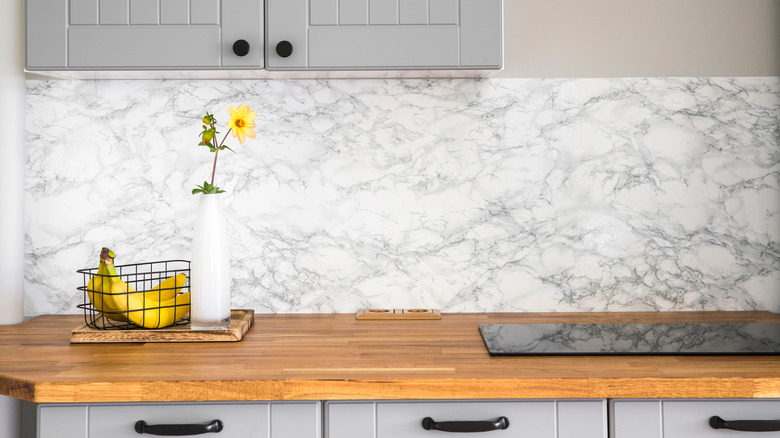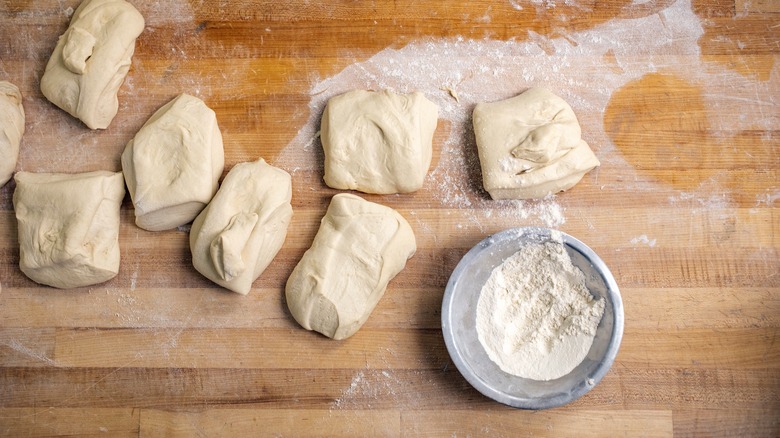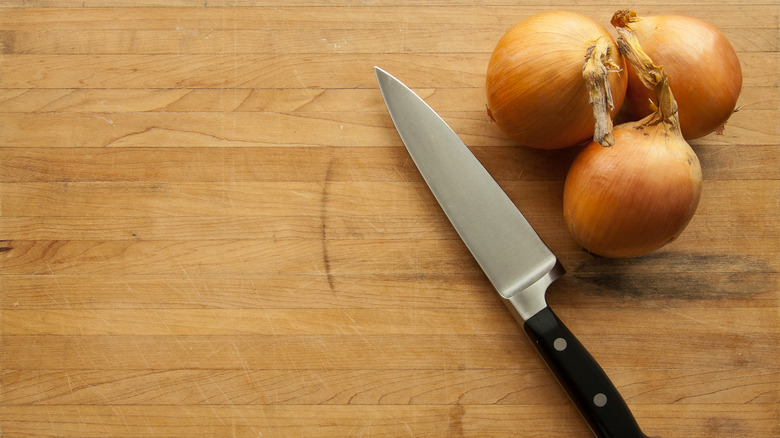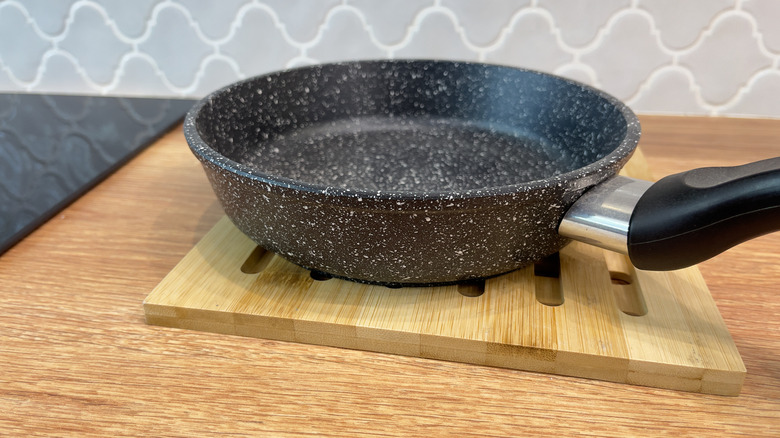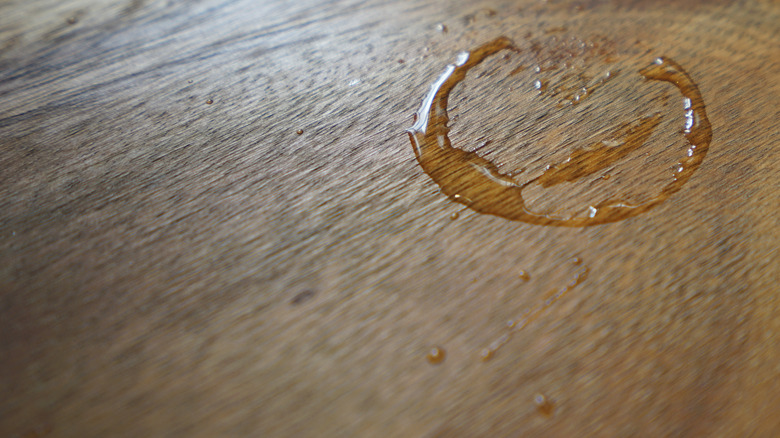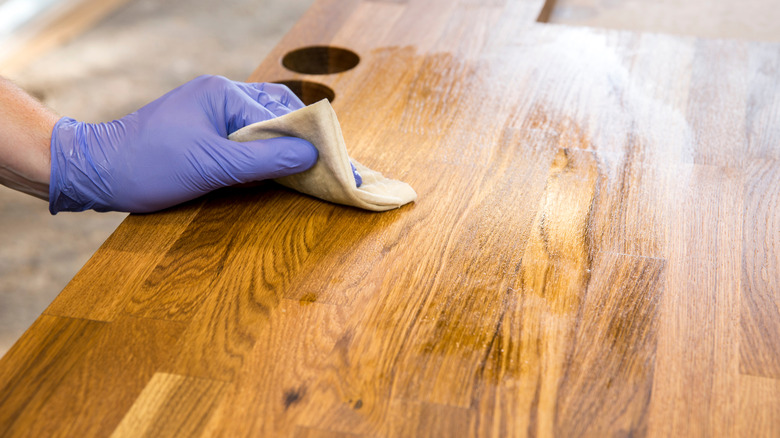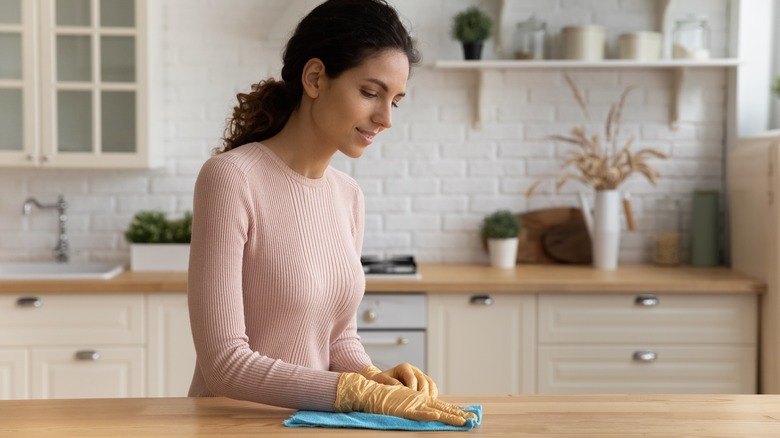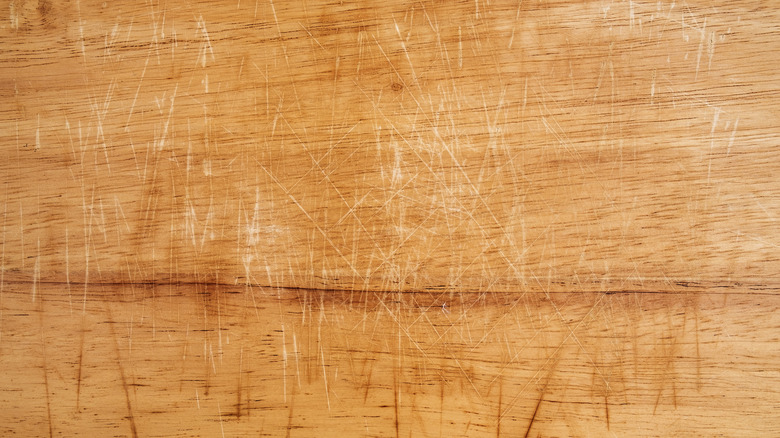Things You Should Never Do If You Have Butcher Block Countertops
With so many different types of countertops to choose from, today's homeowners have no shortage of options. If you're looking for a stylish kitchen remodel, butcher block countertops can certainly make that possible. Whether you're in the middle of planning a complete kitchen renovation, have recently installed new butcher block countertops, or just purchased a home that already had butcher block countertops, you likely have a similar goal: understanding how to take care of your countertops and keep them — and your kitchen as a whole — looking its best.
In order to achieve this goal, it is important to understand what you should — and shouldn't — do if you have butcher block countertops. We'll share some important pointers and highlight big no no's for kitchens with butcher block countertops. Once you understand what you should avoid, you'll be amazed at how easy it is to keep your butcher block countertops looking their best.
Not making the butcher block food safe if you want to use it for prep
Many people are drawn to butcher blocks because of the ability to prep food directly on the counter surface. However, if you plan to use your countertops for food prep, there are a few steps you should take before doing so, namely ensuring that the surface is food-safe. Butcher block countertops must be sealed, but not all sealants are food-safe. Choosing the wrong sealant could alter the flavor, or even safety, of the foods you place directly on the surface.
Always check the label on the sealant you plan to use to ensure it is appropriate for food prep surfaces. Mineral oil is a top choice for sealing butcher block counters, but make sure you use the food-grade version. Not only will it not transfer any odors or flavors to your food, but it also does an excellent job of protecting the wood against being damaged by water spills. A few other food-safe sealants to consider include beeswax, linseed oil, shellac, tung oil, and walnut oil. New countertops should be resealed once a month for the first year; after that, reseal at six-month intervals to keep your butcher block surface in good condition.
Cutting directly on the countertop if you want it to remain scratch-free
With properly sealed butcher block counters, you can cut directly on the surface. However, if you want your countertops to remain perfectly smooth and aesthetically pleasing, you may want to reconsider slicing, dicing, and chopping directly over them. Knives are, obviously, sharp. Every time you use them to cut and chop on the counter, they're going to leave scratches and dings. Over time, these marks will become deeper, more noticeable, and more difficult to sand down.
To maintain those picture-perfect butcher block countertops, consider pulling out a cutting board whenever you need to slice and dice food items. If being able to cut directly on the countertops was the reason you opted for butcher block countertops, then you'll need to embrace the imperfect look. You can minimize the impact by designating one corner or section of the countertops as your cutting zone to help the other sections remain smooth and scratch-free.
Placing a hot pot directly on the surface
Just as placing a hot pot directly on the surface is something you should never do with granite countertops, the same is true with butcher block counters. The wood of a butcher block countertop is not a temperature-resistant material. This means that if something hot, such as a pot right off the burner, is placed on it, the surface will be damaged. In fact, the heat from the pot could cause the wood to crack.
Fortunately, this is something that is easy to avoid. Make sure you have trivets handy, and always place your hot pots on them, not directly on the surface, if you need to prepare something over the counter. The same is true for other hot items, such as pizza stones, coffee pots, or hot pans right out of the oven. A trivet will block the heat from reaching the wooden surface, protecting your countertop from damage.
Letting spills sit on the counter
If you want to keep your butcher block countertops in pristine condition, then you must act quickly whenever water or other liquids spill on them. As you probably already know, wood absorbs water and moisture. If liquid sits on the surface, the wood will soak it up. This can cause the wood to warp and become otherwise damaged. Moreover, bacteria are more likely to grow in damp wood, so you're also putting food safety at risk.
To prevent these potential issues, keep a few microfiber cloths in your kitchen. Anytime anything spills, grab one of the microfiber cloths and use it to wipe up the liquid. Use a second cloth if necessary to make sure the surface is left completely dry. Avoid leaving these damp cloths — or any other damp cloths — sitting on the counter. The moisture from a damp rag will also be able to seep into the wood and cause the issues outlined above.
Forgetting to regularly oil the wood
One of the things everyone should know before purchasing butcher block countertops is that they'll require some regular maintenance. Oiling the wood regularly is one of the things you'll need to do to protect the surface. Without regular oiling, the wood can become dry. Its appearance will change, leaving it looking dull instead of smooth and shiny. A dull-looking surface is also an indication that the wood is not as protected; water and food will be more likely to cause damage to it.
To protect your counters from damage and help maintain their luster, it is important to oil them regularly — anywhere from once a month to once every few months (this is different from sealing). Choose a food-safe oil, such as mineral oil or linseed oil — not a cooking oil like olive oil. Spread the oil over the entire surface with a clean rag. Leave the oil sitting on the counter for about one hour, then repeat the steps to apply a second coat. During the first months of owning your butcher block countertops, you should oil the surface about once a week. After that, you can move on to oiling them once to every few months, depending on how heavily you use them.
Cleaning them the wrong way
Understanding how to clean your butcher block counters is an important part of ownership. Not only will proper cleaning help keep your kitchen free of bacteria and prevent cross contamination, but it will also help protect the counters from damage and keep them looking their best. When cleaning butcher block counters, avoid using bleach, ammonia, or other abrasive cleaners. They can cause the wood to become dull-looking and mess with the sealant's finish. When cleaning, you'll also want to be careful not to let water or other liquids sit on the surface for too long. Remember, excess moisture is the enemy of wood, and you don't want to damage it.
For daily cleaning, a little bit of water is going to be your best cleaning agent. Dampen a microfiber towel, and use it to wipe down the surface of the counters, employing a little elbow grease to remove grimy or sticky substances. When you want to give your countertops a deeper cleaning, dip a microfiber cloth in some vinegar and squeeze out the excess liquid. Wipe the surface with the damp cloth and let the vinegar sit for about 15 minutes before rinsing the counters with a microfiber cloth dampened with plain water. Don't forget to use a clean cloth to dry the counters, too.
Not attending to stains properly
We already explained why it is important to wipe up water and other liquid spills promptly, but you'll also want to make sure that you don't let stains go untreated. Water and/or a bit of vinegar, as described above, will take care of many stains, but there may be times where you'll need to give your countertops a bit more TLC to prevent them from getting stained. Remember, bleach and other abrasive cleaners are not recommended for use on butcher block countertops.
Fortunately, there are some stain removal options you can try that shouldn't damage the surface. One option is to harness the naturally cleaning properties of citrus fruits, particularly lemons. Start by shaking some sea salt over the stained area before using a cut lemon half as a scrub brush. After scrubbing, let the lemon juice sit on the area for several hours before wiping it off with a damp microfiber cloth.
Baking soda is another effective natural stain remover. Cover the affected area with a little baking soda, let it sit for 5 to 10 minutes, and then gently scrub the stain. If the stain persists after a few attempts at removal, you may need to sand and reseal the surface.
Overlooking cracks and scratches
Even when you're careful, your butcher block countertop might still get scratched or cracked. If this happens, acting quickly to address the issue can prevent it from getting worse. Depending on the severity of the crack or scratch, you may be able to handle the repairs on your own. If the surface is just lightly scratched, sanding and resealing the wood should do the trick.
Cracks will require additional care. If it is a very small crack, you can attempt to take care of it on your own. Begin by cleaning the area around the scratch and then sanding it down. Wipe off any sawdust, then use a little wood putty or wood glue to fill in the crack. Check the manufacturer's recommendations to give the glue or putty time to fully dry. Then, lightly sand down anything that remains on the surface before applying a coat of oil. If your butcher block counter has deep cracks, however, you're probably better off calling in a professional to help.
